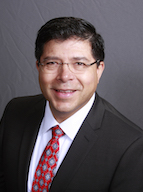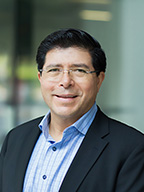Carlos U. Corvera, M.D., FACS
- Professor of Surgery
- Division of Surgical Oncology
- Chief, Section of HPB-GISS(HepatoPancreatoBiliary, GI, Skin, Sarcoma Surgery)
- Maurice Galante Distinguished Professorship in Hepatobiliary Surgery
Contact Information
1600 Divisadero Street
Box 1932 | University of California, San Francisco
San Francisco, CA 94143-1932
Voice (415) 353-9294
Fax (415) 353-9695
[email protected]
Education
1983-86 University of California, Davis, CA B.S. Biochemistry College of Agricultural and Environmental Science
1989-93 University of California, San Diego Medical School. M.D. La Jolla, CA
Residencies
- 1993-1995,University of California, San Francisco, Intern and Resident,Surgery
- 1995-1998 University of California, San Francisco, Research Fellow Surgery, Division of Gastrointestinal Surgery
- 998-2000,University of California, San Francisco, Senior Resident Surgery
- 2000-2001,University of California, San Francisco, Chief Resident Surgery
Fellowships
- 2001-2002, Memorial Sloan-Kettering Cancer Center, Fellow ,Surgical Oncology, New York, New York
- 2002-2003, Memorial Sloan-Kettering Cancer Center, Fellow, Hepatobiliary Surgery, New York, New York
Clinical Expertise
- Ascites
- Bile Duct Cancer (Cholangiocarcinoma)
- Bile Duct Injuries
- Bile Duct Strictures
- Bridging Therapies to Downstage HCC in Setting of Liver Transplantation
- Choledochal Cysts
- Gallbladder Cancer
- Gastrointestinal Carcinoid Tumor
- Gastrointestinal Stromal Tumor (GIST)
- Liver Cancer (Hepatocellular Carcinoma)
- Liver Cysts
- Liver Metastases
- Melanoma
- Minimally Invasive Liver & Pancreas Surgery
- Pancreatic Cancer
- Pancreatic Cysts
- Pancreatic Neuroendocrine (Islet Cell) Tumors
- Portal Hypertension
- Soft Tissue Sarcomas
- Stomach (Gastric) Cancer
Biography
Carlos Corvera, M.D. is Professor of Surgery and Chief of Hepatobiliary and Pancreas Surgery at UCSF. A trained surgical oncologist, Dr. Corvera has extensive experience in the treatment of benign and malignant hepatobiliary disease including hepatocellular carcinoma (primary liver cancer), liver metastases, and cancers of the stomach, gall bladder, bile ducts, and pancreas. Additionally, Dr. Corvera performs surgery for melanoma and soft tissue sarcomas. Dr. Corvera specializes in complex and intricate cancer surgeries, including minimally invasive liver resections that greatly minimize post-operative pain and speed recovery. Dr. Corvera, who performs a high volume of such procedures, is also a pioneer and innovator of surgical techniques in the field.
Dr. Corvera graduated from the University of California San Diego School of Medicine. He completed his general surgery residency at UCSF, and prestigious fellowships in surgical oncology and hepatobiliary surgery at Memorial Sloan-Kettering Cancer Center.
In May 2013, Dr. Corvera was installed as the President of the UCSF Naffziger Surgical Society, the alumni society for the UCSF Department of Surgery and served for the 2013-2014 term. Dedicated to surgical excellence, the society has long served as a forum fostering collaboration between surgeons and promoting surgical advances through its educational forums.
Research Overview
Dr. Corvera's scientific research interest is focused on understanding the mechanisms of biliary tract fibrosis and inflammation. More specifically, he is interested in studying the clinical consequences of biliary fibrosis-- mainly cholestatisis. Cholestasis is characterized by impaired bile flow causing a high concentration of bile acids in the liver and the circulation. Prolonged exposure to bile acids in the liver can progress to end-stage liver disease and cirrhosis. In the gastrointestinal tract, the absence of bile flow causes profound local and systemic metabolic disturbances. Dr.Corvera is actively investigating the role of a novel cell surface receptor specific for bile acids that may play a critical role in normal and disease states.
Publications
MOST RECENT PUBLICATIONS FROM A TOTAL OF 80
- Ashraf Ganjouei A, Romero-Hernandez F, Wang JJ, Casey M, Frye W, Hoffman D, Hirose K, Nakakura E, Corvera C, Maker AV, Kirkwood KS, Alseidi A, Adam MA. ASO Visual Abstract: A Machine-Learning Approach to Predict Postoperative Pancreatic Fistula after Pancreaticoduodenectomy Using only Preoperatively Known Data. Ann Surg Oncol. 2023 Nov; 30(12):7776-7777. View in PubMed
- Ashraf Ganjouei A, Romero-Hernandez F, Wang JJ, Casey M, Frye W, Hoffman D, Hirose K, Nakakura E, Corvera C, Maker AV, Kirkwood KS, Alseidi A, Adam MA. A Machine Learning Approach to Predict Postoperative Pancreatic Fistula After Pancreaticoduodenectomy Using Only Preoperatively Known Data. Ann Surg Oncol. 2023 Nov; 30(12):7738-7747. View in PubMed
- Calthorpe L, Romero-Hernandez F, Casey M, Nunez M, Conroy PC, Hirose K, Kim A, Kirkwood K, Maker AV, Corvera C, Nakakura E, Alseidi A, Adam MA. ASO Visual Abstract: National Practice Patterns in Malignant Peritoneal Mesothelioma-Updates in Management and Survival. Ann Surg Oncol. 2023 Aug; 30(8):5131. View in PubMed
- Calthorpe L, Romero-Hernandez F, Casey M, Nunez M, Conroy PC, Hirose K, Kim A, Kirkwood K, Maker AV, Corvera C, Nakakura E, Alseidi A, Adam MA. National Practice Patterns in Malignant Peritoneal Mesothelioma: Updates in Management and Survival. Ann Surg Oncol. 2023 Aug; 30(8):5119-5129. View in PubMed
- Tbeileh N, Timmerman L, Mattis AN, Toriguchi K, Kasai Y, Corvera C, Nakakura E, Hirose K, Donner DB, Warren RS, Karelehto E. Metastatic colorectal adenocarcinoma tumor purity assessment from whole exome sequencing data. PLoS One. 2023; 18(4):e0271354. View in PubMed
- View All Publications
In the News
- UCSF Surgical Oncology Program - Richard Barg - March 26, 2020Robert S. Warren, M.D. and Carlos U. Corvera, M.D. are co-Principal Investigators on a pilot grant funded through the University of California Minority Patient-Derived Xenograft (PDX) Development and Trial Center (UCaMP) to Reduce Cancer Health Disparities collaborative. Comprised of four of the University of California's NCI-designated comprehensive cancer centers: UC Davis Comprehensive Cancer Center, Jonsson Comprehensive Cancer Center at UCLA, UCSF Helen Diller Family Comprehensive Cancer [...]


- UCSF Department of Surgery - Sarah Krumholz
- July 14, 2015Carlos Corvera M.D. was recently awarded the Maurice Galante, MD Distinguished Professorship in Hepatobiliary Surgery, recognizing his achievements and professional development in general surgery. The Professorship honors the late Maurice Galante, M.D., UCSF professor emeritus of surgery. Dr. Galante was described as "one of the last of a generation of real general surgeons"— those surgeons who bring the same superb technical expertise to a wide variety of surgical procedures. He developed a [...]
- UCSF Department of Surgery - June 15, 2013Carlos Corvera, M.D. was recently installed as the 64th President of the UCSF Naffziger Surgical Society. The Society, an organization dedicated to surgical excellence, is comprised of graduates of the UCSF General Surgery Residency Program and other Department of Surgery faculty who joined at the invitation of the Society. The Naffziger Society has long served as a forum that fosters collaboration between surgeons in diverse settings, from academic medicine to bustling community practices, [...]

- UCSF Department of Surgery - Richard Barg - June 01, 2012In July 2011, the Department of Surgery created a new Hepatobiliary and Pancreas Service naming Carlos Corvera M.D., a hepatobiliary surgical oncologist, as its Chief. The multidisciplinary program brings together faculty members from surgery, hepatology, medical oncology, anesthesia, radiology and pathology to care for patients with benign and malignant conditions of the liver, gallbladder, biliary tract and pancreas. The service holds clinics and weekly tumor boards at the Mt. Zion and [...]

